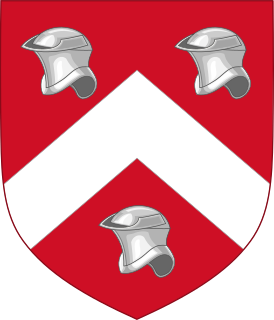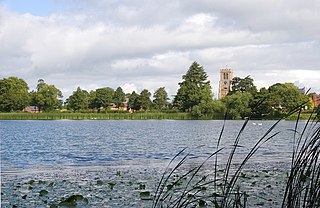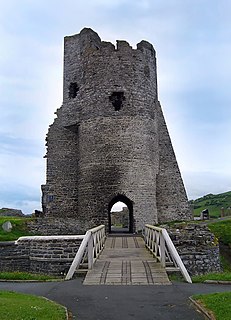Related Research Articles

Owain ap Gruffydd, lord of Glyndyfrdwy, also known as Owain Glyndŵr or Glyn Dŵr, was a Welsh leader who instigated a fierce and long-running war of independence with the aim of ending English rule in Wales during the Late Middle Ages. He was the last native Welshman to hold the title Prince of Wales.

Llywelyn ap Gruffudd, sometimes written as Llywelyn ap Gruffydd, also known as Llywelyn the Last, was Prince of Wales from 1258 until his death at Cilmeri in 1282. The son of Gruffydd ap Llywelyn Fawr and grandson of Llywelyn the Great, he was the last sovereign prince of Wales before its conquest by Edward I of England.

Sir Owen Tudor was a Welsh courtier and the second husband of Catherine of Valois (1401–1437), widow of King Henry V of England. He was the grandfather of Henry VII, founder of the Tudor dynasty.

Deheubarth was a regional name for the realms of south Wales, particularly as opposed to Gwynedd. It is now used as a shorthand for the various realms united under the House of Dinefwr, but that Deheubarth itself was not considered a proper kingdom on the model of Gwynedd, Powys, or Dyfed is shown by its rendering in Latin as dextralis pars or as Britonnes dexterales and not as a named land. In the oldest British writers, Deheubarth was used for all of modern Wales to distinguish it from Hen Ogledd, the northern lands whence Cunedda and the Cymry originated.

Sir David Hanmer, KS, SL (c.1332–1387) was a fourteenth century Anglo-Welsh Justice of the King's Bench from Hanmer, Wales, best known as Owain Glyndŵr's father-in-law and the father of Glyndŵr's chief supporters.

Aberystwyth Castle is a Grade I listed Edwardian fortress located in Aberystwyth, Ceredigion, Mid Wales. It was built in response to the First Welsh War in the late 13th century, replacing an earlier fortress located a mile to the south. During a national uprising by Owain Glyndŵr, the Welsh captured the castle in 1404, but it was recaptured by the English four years later. In 1637 it became a Royal mint by Charles I, and produced silver shillings. The castle was slighted by Oliver Cromwell in 1649.
Y Mab Darogan is a messianic figure of Welsh legend, destined to force the Germanic Anglo-Saxons and Vikings out of Britain and reclaim it for its Celtic Briton inhabitants. A number of figures have been called Y Mab Darogan in history ). An extensive corpus of medieval Welsh prophetic verse, beginning with Armes Prydain, is centred on the figure of Y Mab Darogan.
Gruffudd ap Owain Glyndŵr was the eldest son of Margaret Hanmer and Owain Glyndŵr, who led a major revolt in Wales between 1400 and about 1416.
Dafydd ap Edmwnd was one of the most prominent Welsh language poets of the Later Middle Ages.
Owain ap Llywelyn ab y Moel was a Welsh language poet from Powys.
Sir Gruffudd Vychan was a Welsh knight who supported the rebellion of Owain Glyndŵr against the English, captured the Lollard John Oldcastle and was finally executed after the murder of Sir Christopher Talbot.

The Battle of Pwll Melyn, also known as the Battle of Usk, was part of the Welsh War of Independence against English rule that lasted from 1400 to 1415. This key battle occurred in the spring of 1405. The defeat of the Welsh rebels here was devastating and included the loss of important leaders and men. A contemporary Welsh chronicle described it as a “slaughter” and that: “It was now the tide began to turn against Owain and his men.”

The Glyndŵr Rising, Welsh Revolt or Last War of Independence was an uprising of the Welsh between 1400 and 1415, led by Owain Glyndŵr, against the Kingdom of England. It was the last major manifestation of a Welsh independence movement before the incorporation of Wales into England by the Laws in Wales Acts 1535–1542.
Gruffudd or Gruffydd is a Welsh name, originating in Old Welsh as a given name and today used as both a given and surname. It is the origin of the Anglicised name Griffith[s], and was historically sometimes treated as interchangeable with the etymologically unrelated Germanic name Galfrid. The Welsh form evolved from the Common Brittonic Grippiud or Gripuid.

Sir Rhys ap Thomas (1449–1525) was a Welsh soldier and landholder who rose to prominence during the Wars of the Roses, and was instrumental in the victory of Henry Tudor at the Battle of Bosworth. He remained a faithful supporter of Henry and was rewarded with lands and offices in South Wales. Some sources claim that he personally delivered the death blow to King Richard III at Bosworth with his poleaxe.
Maredudd ap Tudur was a Welsh soldier and nobleman from the Tudor family of Penmynydd. He was one of five sons of Tudur ap Goronwy, and was the father of Owen Tudor. Maredudd supported the Welsh patriot Owain Glyndŵr in 1400, alongside his brothers Rhys ap Tudur and Gwilym ap Tudur; Owain was their cousin.

The Tudors of Penmynydd were a noble and aristocratic family, connected with the village of Penmynydd in Anglesey, North Wales, who were very influential in Welsh politics. From this family arose Owen Tudor and thereby the Tudor dynasty, that ruled England from 1485 to 1603. The Tudor dynasty came to an end in the 17th century.
Ieuan ap Gruffudd Leiaf was a Welsh uchelwr and bard, the son of poet Gruffudd Leiaf. His poetry, spanning the period c.1420 to c. 1470, has been fully edited. The earliest dateable poem that can be confidently assigned to him are a cywydd in praise of Gwilym ap Gruffudd ap Gwilym ap Gruffudd ap Heilin and his newly built home, Y Penrhyn, Llandygái. The context of this poem seems to be the tradition of the'cyff clêr', with Ieuan, a 'prifardd', answering the taunts of lesser bards. Rhys Goch Eryri was present at the celebration and composed a perhaps more well-known praise poem to Y Penrhyn and its owner. Shortly after this, Ieuan composed a cywydd satiring the River Llugwy, into which the poet fell on his way to Y Penrhyn one Christmas. A cywydd to Saint Anna, mother of the Virgin Mary and two other daughters also named Mary, attributed to Ieuan in the only manuscript in which it survives, could also be from the same period or earlier.
References
- 1 2 3 4 "Llywelyn ab y Moel, fl. c.1395/1400–d. 1440". Guto's Wales. Retrieved 2 November 2021.
- ↑ E. A. Rees (2008). A Life of Guto'r Glyn. Y Lolfa. p. 48. ISBN 978-0-86243-971-2.
- 1 2 3 Looker, Ray. "LLYWELYN ap MOEL Y PANTRI (died 1440), poet of Llanwnnog, Montgomeryshire". Dictionary of Welsh Biography . National Library of Wales . Retrieved 2 November 2021.